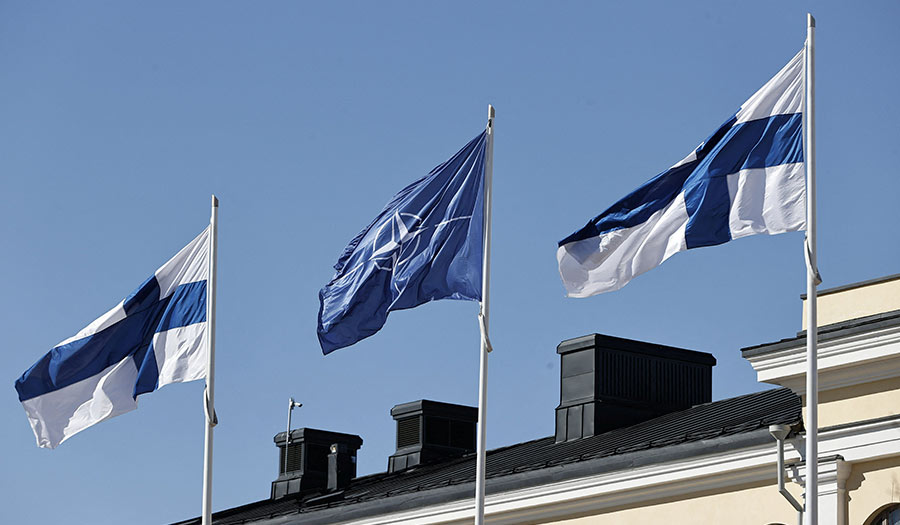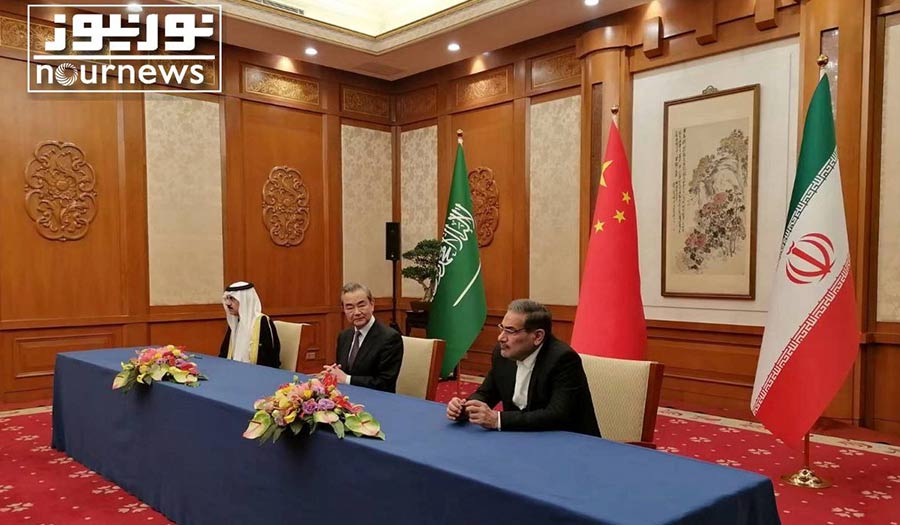 Lehtikuva/Antti Hamalainen via REUTERS
Lehtikuva/Antti Hamalainen via REUTERS
World News Desk
Learn the why behind the headlines.
Subscribe to the Real Truth for FREE news and analysis.
Subscribe NowHELSINKI/BRUSSELS (Reuters) – Finland formally joined NATO on Tuesday, its flag unfurling outside the military bloc’s Brussels headquarters, in a historic policy shift brought on by Russia’s invasion of Ukraine, drawing a threat from Moscow of “counter-measures.”
Finland’s accession roughly doubles the length of the border that NATO shares with Russia and bolsters its eastern flank as the war in Ukraine grinds on with no resolution in sight.
Finnish Foreign Minister Pekka Haavisto completed the accession process by handing over an official document to U.S. Secretary of State Antony Blinken at NATO’s HQ.
Finland’s flag—a blue cross on a white background—was hoisted alongside those of the alliance’s 30 other members as a military band played in bright sunshine.
“For almost 75 years, this great alliance has shielded our nations and continues to do so today,” NATO Secretary-General Jens Stoltenberg declared at the ceremony. “But war has returned to Europe and Finland has decided to join NATO and be part of the world’s most successful alliance.”
Mr. Stoltenberg earlier noted that Russian President Vladimir Putin had cited opposition to NATO’s eastward enlargement as one justification for invading Ukraine.
“He is getting exactly the opposite...Finland today, and soon also Sweden will become a full fledged member of the alliance,” Mr. Stoltenberg said in Brussels.
Finnish President Saul Niinisto said Finland’s most significant contribution to NATO’s common deterrence and defense would be to defend its own territory. There is still significant work to be done to coordinate this with NATO, he said.
“It is a great day for Finland and I want to say that it is an important day for NATO,” Mr. Niinisto said at a joint news conference with Stoltenberg.
The Kremlin said Russia would be forced to take “counter-measures” to Finland’s accession. Defense Minister Sergei Shoigu said the move raised the prospect of the conflict in Ukraine escalating further.
Russia had said on Monday it would strengthen its military capacity in its western and northwestern regions in response to Finland joining NATO.
The Ukrainian government also hailed Finland’s move. President Volodymyr Zelenskyy’s chief of staff Andriy Yermak wrote on Telegram: “FI made the right choice. NATO is also a key goal for Ukraine.”
End to Military Non-alignment
The event marks the end of an era of military non-alignment for Finland that began after the country repelled an invasion attempt by the Soviet Union during World War II and opted to try to maintain friendly relations with neighboring Russia.
But the invasion of Ukraine in February 2022 prompted Finns to seek security under NATO’s collective defense pact, which states that an attack on one member is an attack on all.
Moscow, which long criticized the move, reacted crossly.
Kremlin spokesman Dmitry Peskov said the NATO expansion was an “encroachment on our security and on Russia’s national interests.” Moscow would watch closely for any NATO military deployments in Finland, he said.
Since the end of the Cold War three decades ago, Moscow has watched successive waves of NATO enlargement to the formerly communist east of Europe with consternation, and the issue was a bone of contention even before the invasion of Ukraine.
NATO has repeatedly stressed that it is solely a defensive alliance and does not threaten Russia. Moscow says the funneling of heavy weaponry to Ukraine by NATO countries since the war began proves the West is bent on destroying Russia.
Finland’s accession brings NATO significant military capabilities developed over the years as it is one of the few European countries to have retained a conscription army through decades of peace, wary of Russia next door. In addition, Finland’s ground, naval and air forces are all trained and equipped with one primary aim—to repel any Russian attack.
On their way to work on Tuesday, Helsinki residents welcomed Finland’s entry into NATO, saying they felt more secure.
“I feel it’s a good thing that Finland is joining NATO. We have been here next to Russia for ages,” said Outi Lantimaki, 59, a designer at a shipyard. “My father was in the war with the Russians so this is like a personal thing to me.”
People in the Russian city of St. Petersburg, only out 93 miles from the Finnish border, said Finland could be making problems for itself by joining NATO.
“I don’t think this is a very pleasant thing because we had good, neighborly relations with Finland for quite a long time. It joining NATO isn’t based on anything. But I hope reason will prevail and that there’ll be no bad, military conflicts after this,” said one resident who gave his name only as Alexi.
Finland and its Nordic neighbor Sweden applied together last year to join NATO, but the Swedish application has been held up by NATO members Turkey and Hungary.
Swedish Foreign Minister Tobias Billstroem told reporters it was Stockholm’s ambition to become a member at the NATO summit in Vilnius in July.
Turkey says Stockholm harbors members of what Ankara considers terrorist groups—an accusation Sweden denies—and has demanded their extradition as a step toward ratifying Swedish membership.
Hungary cites grievances over criticism of Prime Minister Viktor Orban’s record on democracy and rule of law.
- World News Desk
- GEOPOLITICS
 Iran, Saudi Arabia Agree to Resume Ties, with China’s Help
Iran, Saudi Arabia Agree to Resume Ties, with China’s Help
More on Related Topics:
- China Has Expanded Its Nuclear Force and Strengthened Ties to Russia, the Pentagon Says
- North Korea’s Kim Again Threatens to Use Nuclear Weapons Against South Korea and U.S.
- Russia and North Korea’s Partnership
- Hamas and Fatah Agree to Form a Government. What Does It Mean and Who Are These Palestinian Groups?
- President Biden’s Withdrawal Injects Uncertainty into Foreign Policy Challenges


